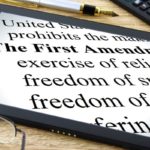In Harwinton, Connecticut, in the back room of a law office nestled between the Liquor Lady and a plot of weathered gravestones along sleepy Burlington Road, Rachel Baird and Edward Peruta cohost a live-streaming internet talk show at 7 a.m., Mondays through Thursdays. For the edification of their 251 subscribers, they parse the minutiae of constitutional law and discuss the many legal battles in which one or both are personally embroiled—she as attorney, and he as legal investigator (or plaintiff). The set looks a bit like Saul Goodman’s office in “Breaking Bad” — complete with a floor-to-ceiling backdrop of the Declaration of Independence. This week the crew is on vacation, so Rachel sits alone next to an empty chair as the show begins, while Ed operates equipment off camera. When he joins her, the mood is funereal for a moment.
“I can commiserate with you and sympathize with you,” Rachel offers. “How devastating it is when something like this happens.”
For nine years, Ed Peruta has been at the heart of the most significant Second Amendment lawsuit in the country, Peruta v. California. He challenged the state’s relatively strict gun laws and asserted that he had a constitutional right to carry a gun in public spaces. Last Monday, on the final day of its session, the Supreme Court declined his petition for a writ of certiorari, meaning they would not hear arguments and issue a ruling. The upshot is that a lower court decision will stand, and California sheriffs will retain the discretion to deny concealed carry permit applications.
It’s undoubtedly a win for gun control advocates, not only in California but also in eight other states (and the District of Columbia) with similar licensure processes that could have been affected by a Supreme Court ruling. But while the court is done with Peruta’s case, the arguments he raised remain intensely relevant to the national debate over the right to carry a weapon in public. Peruta is one of about 15 million people in the U.S. with a permit to carry a concealed weapon. In fact, he has permits from two states—Connecticut and Florida. But those permits, unlike a license to drive a car, do not give him the right to carry a weapon in every other state. Peruta believes his case has helped to focus national attention on the disparate rights to carry publicly that gun owners experience from state to state.
by Matt Valentine



